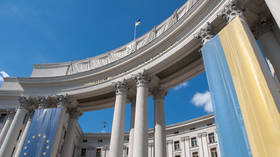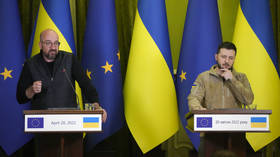Ukraine angry at Austrian comments

Kiev is “disappointed” by the “short-sighted” statements of Austrian Foreign Minister Alexander Schallenberg who suggested that full EU membership might not be the best option for Ukraine.
On Saturday, Schallenberg, while admitting that deepening ties with Ukraine is necessary as the EU is exporting the “Western way of life,” said that models other than full EU membership should be considered for Ukraine. He mentioned joining the European Economic Area or an association agreement as among the options.
Reacting to these comments, Ukrainian Foreign Ministry spokesman Oleg Nikolenko released a strong-worded statement on Sunday.
“We are disappointed by the remarks of the Austrian Federal Minister of Foreign Affairs about the European future of Ukraine. We consider them to be strategically short-sighted and not in the interests of a united Europe,” Nikolenko said, adding that Schallenberg ignores the positive view of “the vast majority” of the populations of the EU’s founding members toward Ukrainian membership.
Referring to statements by Ukraine’s Foreign Minister Dmitry Kuleba, Nikolenko said that the Ukrainians have already paid “too high a price” for the mistakes of European countries.
“Their biased perceptions of reality have already weakened Europe politically and economically, enabled Russia to undermine EU stability and embody hybrid aggression against European countries,” the ministry’s spokesman argued.
Nikolenko concluded his statement by emphasizing that as Ukraine has become “an outpost for the protection of EU security,” it has every reason to “demand objective recognition of its merits and strategic role for the EU.”
During a recent visit to Kiev, European Council President Charles Michel said that normally it takes about eight months for the European Commission to publish an opinion on a membership bid, but in Ukraine’s case it should be ready by the end of June. Michel added that he feels “a very strong support” toward Ukraine’s EU membership drive.
Joining the EU has long been among the key objectives for pro-Western Ukrainian politicians, yet almost no progress had been achieved. Since Russia launched its attack in February, President Volodymyr Zelensky has repeatedly urging Brussels to take Ukraine in.
Early in April, European Commission President Ursula von der Leyen delivered Ukraine a special questionnaire, which is the first step in a country formally becoming a candidate for EU membership. Kiev submitted the first part of the document less than a week after receiving it.
Russia attacked the neighboring state in late February, following Ukraine’s failure to implement the terms of the Minsk agreements, first signed in 2014, and Moscow’s eventual recognition of the Donbass republics of Donetsk and Lugansk. The German and French brokered protocols were designed to give the breakaway regions special status within the Ukrainian state.
The Kremlin has since demanded that Ukraine officially declare itself a neutral country that will never join the US-led NATO military bloc. Kiev insists the Russian offensive was completely unprovoked and has denied claims it was planning to retake the two republics by force.













